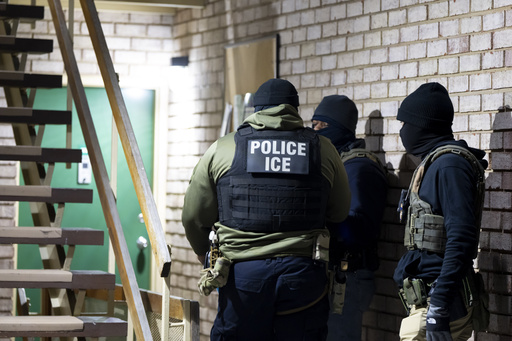
In the inaugural week of Donald Trump’s presidency, he enacted ten executive orders concerning immigration and outlined various directives aimed at fulfilling his commitments to mass deportation and enhancing border security. Some of these measures had immediate effects, while others are currently facing legal challenges in court.
During a Reddit discussion known as an Ask-Me-Anything (AMA), immigration news editor Elliot Spagat, alongside Rebecca Santana, who reports on the Department of Homeland Security, and Christopher Sherman, the director of news for Mexico and Central America, engaged with users about Trump’s immigration plans. They shared insights into the actions already taken, what may unfold in the near future, and which developments could take longer and face uncertainty in realization.
This Q&A has been modified for conciseness and readability, while preserving the essence of the original dialogue.
One of the key questions posed asked if Trump’s ambition to deport every undocumented immigrant is practically viable given the current size of Immigration and Customs Enforcement (ICE). Santana provided detailed context, noting that approximately 1.4 million individuals already have final removal orders. This means a judicial ruling has determined that they cannot stay in the country. Additionally, around 660,000 people under immigration supervision have criminal convictions or are facing charges, and these cohorts are being prioritized for deportation efforts by Trump’s administration.
With about 6,000 officers dedicated to Enforcement and Removal Operations (ERO), the disparity between the number of deportation cases and available personnel is significant. The government has sought assistance from various agencies like the FBI, IRS, and DEA to bolster their immigration enforcement efforts and has advocated for collaboration with state and local law enforcement agencies. However, given the intricate nature of immigration laws, ERO officers remain the most adept in this area.
Another question focused on the agreement with El Salvador and its potential impact on refugees. Sherman highlighted the distinction between refugees, defined under U.S. law, and asylum seekers, noting that refugees must apply from outside the U.S. to be admitted. Earlier arrangements made during Trump’s first term with El Salvador, Guatemala, and Honduras allowed for the sending of asylum seekers back to those nations to seek protection. Recent discussions during U.S. Secretary of State Marco Rubio’s recent visit appear to expand this agreement to include all deportees—not solely asylum seekers.
During Rubio’s visit, El Salvador’s President Nayib Bukele offered to accept convicted criminals from the U.S. for a fee, generating a lot of media attention. However, it was also stated that El Salvador would be willing to accept deported individuals of any nationality and detain them in their prisons—details of which have been largely undisclosed. This raises concerns among human rights advocates, particularly because El Salvador is currently under a state of emergency that has curtailed basic civil rights, including the right to legal representation.
Spagat also addressed anticipated legal challenges against ICE’s potential overreach. It is common practice for immigration policies to face judicial scrutiny. Recently, numerous religious organizations have banded together to file a lawsuit challenging Trump’s directives that make it easier for immigration officers to conduct arrests at sensitive locations such as places of worship—a significant deviation from ICE’s policies established since 2011.
Moreover, the American Civil Liberties Union (ACLU) has taken legal action against the expansion of expedited removal policies that allow ICE to deport individuals without an immigration court hearing unless they file for asylum. ICE operates long-term detention centers for immigrants, which are likely to be the focus of upcoming litigation, particularly as other federal agencies—like the Bureau of Prisons and military—become involved in immigration detention matters.
Overall, Spagat indicated that it is likely for immigration-related legal matters to eventually reach the Supreme Court, as the significant implications of these policies mean neither side would settle easily. The critical query remains whether these policies will be paused through injunctions while the lengthy litigation process unfolds.

